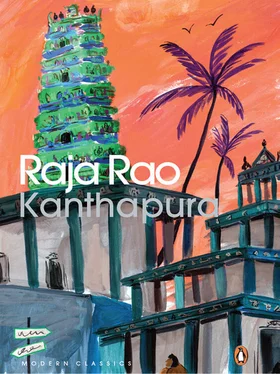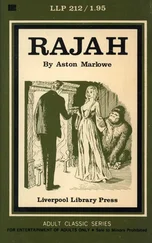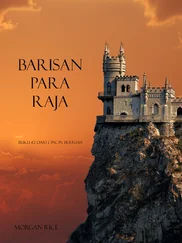‘He, this wretch! What’s all this noise about?’ asks Madanna of Siddayya.
‘Ah, in this country it’s like this,’ says Siddayya. ‘And once it begins there is no end to her tricks. ’
‘Hm!’
And from the bamboo cluster the voices of women are heard, and high up there, on the top of the hill, the sahib is seen with his cane and his pipe, and his big heavy coat, bending down to look at this gutter and that. The rain swishes round and pours, beating against the treetops, grinding by the tree trunks and racing down the waving paths. It swings and swishes, beats and patters, and then there is but one downpour, one steady, full, ungrudging pour. And somewhere is heard a whistle, the maistri’s whistle, which whines and whines, and Siddayya says to Madanna, ‘That’s for us to go home,’ and ‘Hè-ho, hè-ho,’ the husbands call to their wives, fathers to their daughters, mothers to their sons, and elder brother to younger brother, and through slush and stream they move on, men and women and children, squeezing their clothes and wiping their hair, and the rain pours on and on, a steady, full, ungrudging rain.
‘It’s like this in the mountains.’
‘How long?’
‘One day, two days, three days. And till then eat and sleep with your woman, sleep with your woman and eat. ’
‘Fine thing. this rain. ’
It poured just three nights and four days — the south-west rain.
And when the days became broad and the sky became blue as a marriage shawl, men and women and children rose again with the whistle to go to work — but for Rachanna’s child, Venki, seven years old, and Siddanna’s wife, Sati, the same who had had the stomach ache in the train, and Sampanna’s sister-in-law, and Mada’s two children. They all lay on their mats; for on the night before, they all had chills, and the chills rose and rose, while every dhoti, coat and turban and blanket was heaped on them, and yet the chill was piercing as ever. And then came fever, leaping, flaming fever, and the whole night they grinned and grit their teeth, and they cried for water and water and water, but the elders said, ‘No, no one drinks water when he has fever,’ and with the morning the fever went down, but a weakness remained which made their heads dizzy and their stomachs nauseating.
‘Oh, it’s the fever of this country,’ Siddayya explained. ‘It’s always like this. It harms no one. It comes every two days and goes away, and when you know it better, you can work with it as well as any.’
But this morning they would not work. It simply made them vomit at every step. When the sahib heard of it he sent a new man, who looked just as tall and as city-bred as the maistri, and he gave them eight pills each, eight pills for two days, and said if they took them, well, the fevers would die away. But ‘Don’t bother to swallow them,’ explained Siddayya. ‘They are as bitter as the neem leaves and the fever will come just the same. The sahib says that in his country they are always used for fever. But he does not know our country, does he?’ And the women said, ‘That is so — what does he know about us?’ And Siddanna’s wife, Sati, asked her neighbour Satamma, who had lived there for one year and more, what goddess sanctified the neighbouring region, and when Satamma said it was our Kenchamma, she tore a rag from her sari-fringe, and put into it a three-pice bit and a little rice and an areca nut, and hung it securely to the roof. And, of course, she woke up the next morning to find no fever at all, though Madanna’s second child still had it, hot, very hot. ‘Oh, it’s the grace of Kenchamma,’ she said to Madanna; so Madanna did the same, but the fever would not go. And so he said he would try the sahib’s pill, but his wife said, ‘If the gods are angry — they’ll take away not only your children but yourself, oh, you man. ’ and he, frightened, beat his cheeks and asked pardon of Sri Kenchamma. But he had had a wicked thought. Kenchamma would not forgive him. Fever on fever came, and the poor child’s ribs began to show and its belly to swell, and one day as he was just going to sleep, the child began to say this and that wildly and they all said, ‘Go and call the sahib,’ and when the sahib came, the child shivered and died in his arms. And the sahib grew so fierce that he gave Madanna a whipping there and then, and ordered that everybody should by his command take six pills a day. Some took them but others threw them into the backyard, and the maistri-looking man who had brought them said, ‘If you don’t take it, it does not matter. But never tell the sahib you don’t, and let me use it for myself; and the women said, ‘Of course! Of course!’ But one by one in this house and that, in this line and that, fevers came, and when it was not fever it was stomach ache and dysentery, and when it was not dysentery it was cough; and one thing or the other, such things as were never heard of in the plains.
‘On the Godavery it’s not like this, is it, Father Siddayya?’
‘No, brother. But this wretch of a rain,’ and drawing away his hookah, he spat the south-west way.
But the south-west rain went flying away, and then came the north-east wind and it blew and blew until the thatches were torn away and the walls felled; and then it dripped, fine, endless, unflooding rain, whilst the fevers still came and went. Then Madanna’s second child died, too, and two days later Sidda’s father Ramayya, and Venka’s old mother — and just as children began to fall out of their mother’s wombs, children, men and women were going away and were buried or burnt on the banks of the Himavathy.
Then Pariah Rangayya said, ‘We’ll make three hundred rupees in all — three hundred rupees each, and we shall take our money and scuttle down the passes like kitchen bandicoots; and once we are there we’ll throw over a few clods of earth, and grass won’t grow where the rice is thrown. ’
‘Ah, you have much mind,’ laughed Siddayya quietly, sucking away at his hookah. ‘We all said that. ’
‘Why not, Uncle? We earn four annas a day for each man-hand and that makes one rupee twelve annas a week, and that makes seven rupees eight annas a month. That’s what we make, and throwing in the three rupees or so that our women make, and the little that the brats make, and taking from all this our five rupees for ragi and rice water, the rest is all with the sahib. And what after all is the railway fare we owe to the maistri — we still can have our three hundred rupees to take back with us? Now, isn’t that true, Uncle?’
‘Well, so be it!’ said Siddayya, and walked away silently. He knew that when one came to the Blue Mountain one never left it. But for Satanna and Sundarayya, who had not brought their women with them, and had sworn before the goddess, ‘Goddess, break my legs if ever we seek the toddy booth.’ For once you get there, the white, frothy toddy rises to the eyes, and as Timmayya’s Madayya beats the drum and everybody sings,
Laugh, laugh, laugh away,
The King of Heaven is coming,
Hè, the King of Heaven is coming,
Say, Bodhayya,
The King of Heaven is coming,
pot after pot of toddy is brought to you, and you drink and you sway your shoulders this way and that, and you cry out, ‘Well done! Well done for our Madayya!’
. And the King of Heaven is coming.
And money goes this way and that, and there are marriages and deaths and festivals and caste-dinners, and a sheep costs five rupees now, and Rama Chetty sells fine rice at three seers and a half a rupee, and butter is twelve annas a seer; and then so much for the maistri for procuring an advance, and so much for Butler Sylvester for stolen fuel, and so much for Bhatta’s interest charges, for if your woman has put forth a she-goat, a she-goat needs a he-goat, and a he-goat, well, you have to weigh it out in gold. And gold has wiles as a wanton woman has wiles. ‘Three hundred rupees! Well, if he’ll have it, let him have it. This much I know, nobody who sets foot on the Blue Mountain ever leaves it. That is her law!’
Читать дальше












